Biography
Akihiro "Ike" Ikuhara: Friendship Beyond Borders
By Brent Shyer and Robert Schweppe
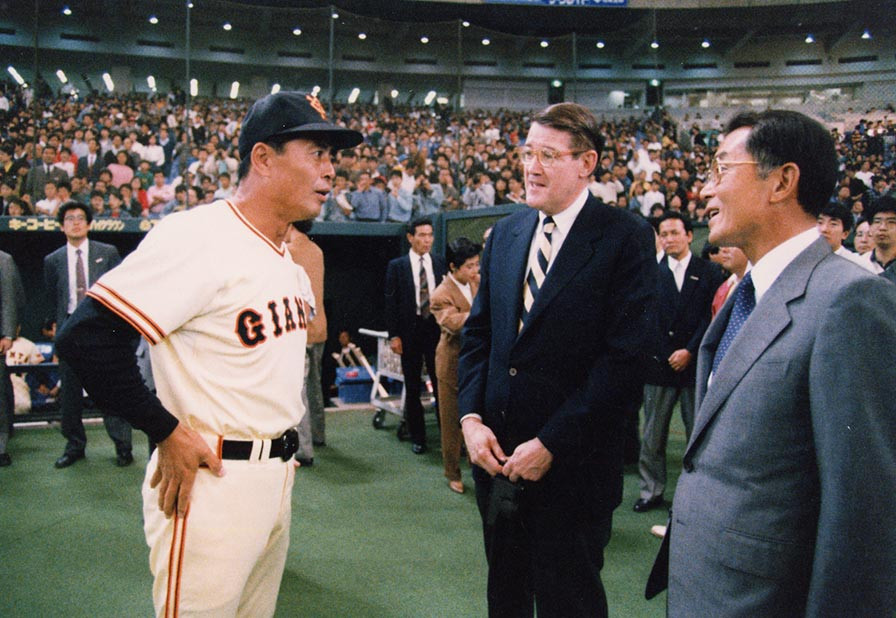
(L-R): Japan Hall of Fame slugger Sadaharu Oh of the Tokyo Yomiuri Giants greets Peter O’Malley and Akihiro “Ike” Ikuhara pregame as they attend the Old-Timers’ All-Star Game in Tokyo Dome on November 4, 1989.
History will remember Akihiro “Ike” Ikuhara as a man who courageously followed his dream.
Ikuhara might have enjoyed a long baseball coaching career in his native-born Japan, but he had aspirations that exceeded that goal, one that would take him across the Pacific Ocean to the United States of America. Borders would never define Ikuhara. Instead, he crossed borders and developed friendships around the world.
A native of Kawara, Fukuoka, Japan, he played baseball as a catcher for prestigious Waseda University in Tokyo, where he graduated with his Bachelor of Science degree as a law major in 1959. Ikuhara worked for Riccar Sewing Machine Company (1959-1961) before playing semi-pro ball as a first baseman and then landing a position as Head Baseball Coach (1961-1964) at Asia University, Tokyo.
But, still restless to pursue his dream of learning more about the business side of professional baseball in the United States, Ikuhara had a plan. He sought out well-respected Yomiuri columnist Sotaro Suzuki’s assistance for an introduction to Dodger President Walter O’Malley. Ikuhara went to visit Suzuki at his home in Yokohama. Multiple times when Ikuhara approached him, Suzuki wanted to think about it. Ikuhara was an avid reader of Suzuki’s columns and years earlier had also followed the excitement of the Dodgers 1956 Goodwill Tour to Japan. “Gil Hodges, Roy Campanella, Duke Snider – those were awfully big names,” once told the Los Angeles Times. “I couldn’t believe I was seeing them.” Dwight Chapin, Los Angeles Times, ”Japanese Baseball Fan’s Hope of Becoming a Dodger Realized”, July 30, 1969 It whet his appetite to see more American baseball.
In fact, Suzuki was more than a columnist, he was emissary to Matsutaro Shoriki, the “father of professional baseball in Japan” and had arranged the details of that trip with O’Malley. Suzuki was also credited with helping to bring baseball back to fans in Japan during Allied Occupation and Reconstruction after World War II.
Ikuhara persisted and he decided to bring his wife Kimiko dressed in a kimono with him to Suzuki’s residence. She and Suzuki’s wife Toku spoke at the door and finally the Ikuharas were invited into the home’s drawing room. After asking many questions, Suzuki was convinced of Ikuhara’s sincerity and he crafted a letter of introduction to O’Malley on February 8, 1965 about a 28-year-old who doesn’t speak English but wants to travel to America and learn about the business side of baseball.
“I have met a very promising man who has recently come to me and my home quite often to become a good friend through baseball,” Suzuki wrote to O’Malley. He continued about the baseball coach, “So far I have observed his actions in the camp (an instructional camp conducted by Tommy Lasorda and Dodger scout Kenny Myers) and have known Ikuhara to be alert, earnest, and a very hard worker.”
Then, in concluding, Suzuki makes this bold prediction, “I am sure he shall be a good help to your organization some days in the future.”
In the letter, Suzuki suggested that Ikuhara begin by traveling that spring to Dodgertown, Vero Beach, Florida, where Suzuki would accompany him. On his friend’s recommendation, O’Malley was happy to oblige and hired Ikuhara. First, Ikuhara had to secure $7,000 to make the trip and pay for expenses for two years. Kimiko’s father and Ikuhara’s dad Sashichiro, who was an elementary school teacher, made that possible. Once the funding was achieved, friends from Waseda and Asia Universities, plus family members, gathered at Haneda Airport in Tokyo the first week of March, 1965 to see Ikuhara off and wish him well, as he boarded Japan Air Lines to Los Angeles, unsure of when he would return.
On March 12, 1965, Ikuhara and Suzuki flew in the Dodger-owned Lockheed Electra II airplane, “Kay O’”, christened for the First Lady of the Dodgers Kay O’Malley and headed to Vero Beach, Florida. Walter O’Malley was at the Vero Beach Airport to greet Suzuki and meet Ikuhara. Kimiko temporarily stayed in Japan to raise their son Mutsuo.
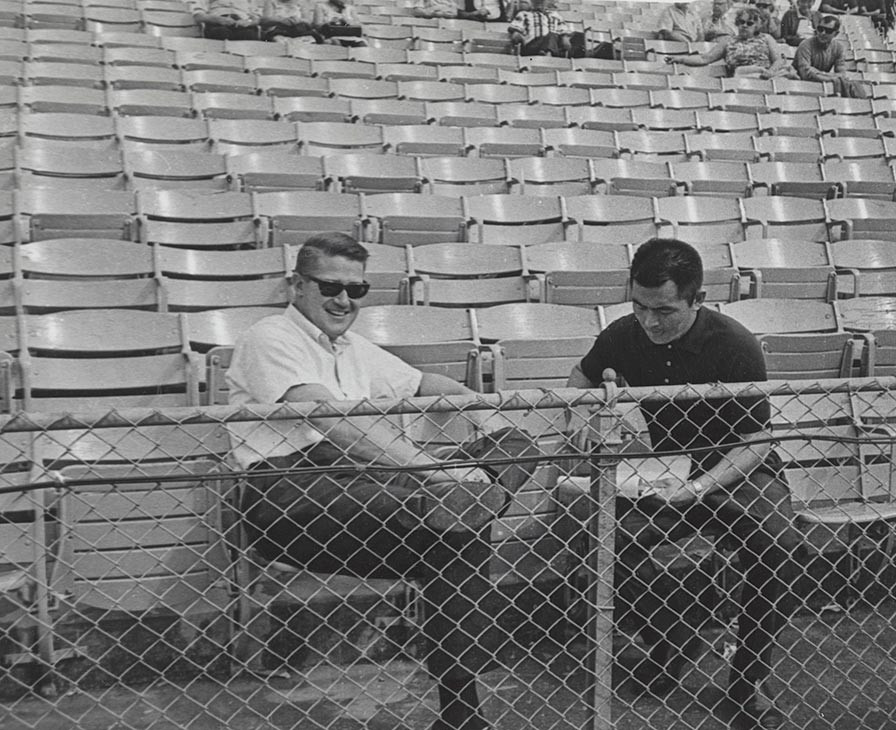
Peter O’Malley and Akihiro “Ike” Ikuhara at Holman Stadium, Dodgertown, Vero Beach, Florida circa 1965. Ikuhara started his Dodger baseball executive career at Dodgertown in the spring of 1965.
Ikuhara started immediately with the Dodgers at Dodgertown to learn the basic operations of a major league front office and its seven days per week work schedule. He was an early riser and would outwork anyone with his dedication. Following his spring at Dodgertown, Ikuhara was asked to join Peter O’Malley in Spokane, Washington where Peter was President and General Manager of the Spokane Indians, Dodgers’ Triple-A affiliate of the Pacific Coast League, for two years (1965-66). Among Ikuhara’s many responsibilities, he managed the clubhouse in Spokane. O’Malley helped him to improve his English language skills and since Ikuhara was still removed from his wife and son, they frequently shared meals together while working long hours at the ballpark. The two bonded and became good friends.
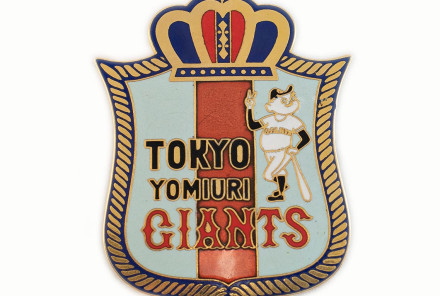
The Tokyo Yomiuri Giants created a special pin to commemorate the team in 1966 for the Dodgers Goodwill Tour to Japan.

During Dodgers’ 1966 Goodwill Tour to Japan, (L-R): Kay O’Malley; Peter O’Malley; Japan Baseball Hall of Fame executive Akihiro “Ike” Ikuhara; Japan sports columnist Sotaro Suzuki, member of the Japan Baseball Hall of Fame.
In June, 1966 with encouragement from Walter and Peter, Ikuhara finally had his family join him in Spokane. That fall, Ikuhara became invaluable to the Dodgers in planning and executing the details of the Dodgers Goodwill Tour to Japan, where they played 18 exhibition games throughout the country. The Dodger traveling party was happy to have his assistance throughout the trip. Upon returning to Japan for the 1966 Dodgers Goodwill Tour, Ikuhara said, “It was like a dream.” Ibid.

Akihiro “Ike” Ikuhara became Assistant to President Peter O’Malley in 1982. He is shown at the Dodgertown, Vero Beach, Florida ticket office. Ikuhara worked closely with Peter O’Malley to develop international baseball friendships and the emergence of players from Asia to play in the major leagues. Ikuhara was elected to the Japan Baseball Hall of Fame in 2002.
When Peter moved to Los Angeles as Vice President, Stadium Operations in 1967, Ikuhara went as well to further his baseball business education at Dodger Stadium. Ikuhara purchased a home for his family in Gardena, CA. His career encompassed several front office jobs, including working in ticket sales, marketing, accounting, scouting, player development and minor league operations, plus as interpreter. Ikuhara also worked in the press box during games, controlling with great accuracy the ball, strike and out indicators on the Dodger Stadium right field scoreboard. The Dodgers found him extremely dedicated, first to arrive in the morning at Dodger Stadium. Ikuhara also was an avid runner who was regularly in the Dodger Stadium parking lots. He was also a man of great character, honest, and a good listener.

Akihiro “Ike” Ikuhara (left) and Dodger President Peter O’Malley are in Tokyo in late October for the 1970 Japan Series between the Tokyo Yomiuri Giants and the Lotte Orions. The Los Angeles Times reported that fall that O’Malley is the first official of a Major League Baseball team to attend the Japan Series.
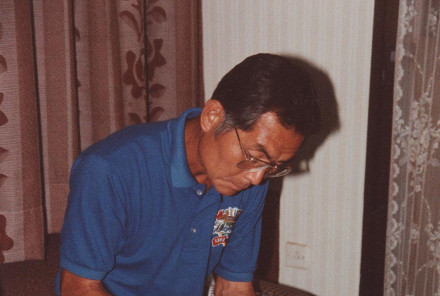
Akihiro “Ike” Ikuhara, Assistant to President Peter O’Malley, circa 1990 at Dodgertown, Vero Beach, Florida. He would write Spring Training information and rules in Japanese for the guests from Japan.
Peter O’Malley was named Dodger President on March 17, 1970 as his dad became Dodger Chairman of the Board. As Peter became more involved with pursuing groundbreaking international opportunities, Ikuhara was by his side. When the professional Tokyo Yomiuri Giants were invited by the O’Malley family to spend multiple spring trainings at Dodgertown, Ikuhara served as goodwill ambassador for and supervised those visits in 1967, 1971, 1975, and 1981, plus the professional Chunichi Dragons from Nagoya, Japan in 1988. Ike handwrote all the Dodgertown Spring Training information and rules in Japanese for the guests to make everyone feel welcome.
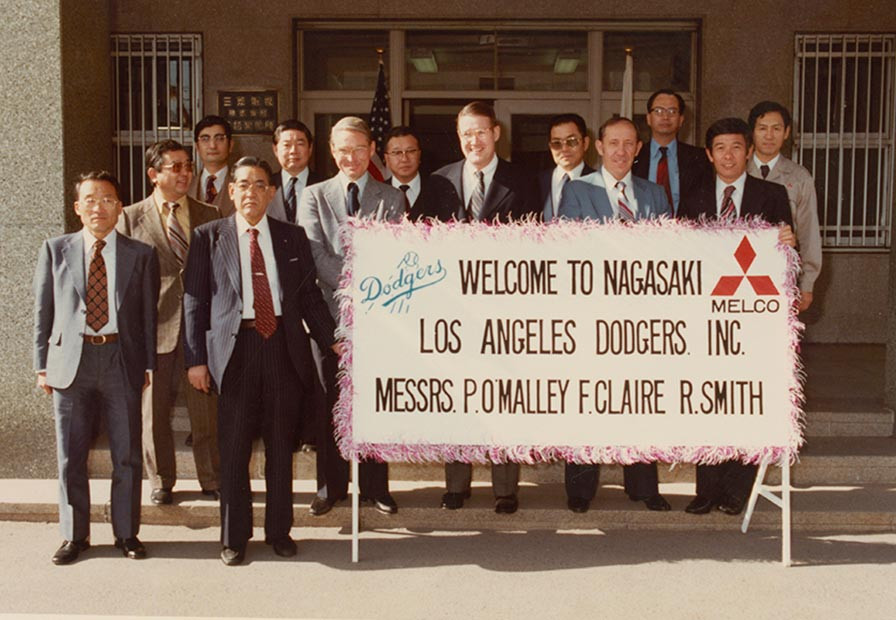
On February 12, 1980, Dodger executives are welcomed with a sign to the Mitsubishi Electric Company in Nagasaki, Japan for a scale-model demonstration of Diamond Vision technology. Center of photo, Fred Claire, Dodger Vice President, Public Relations and Promotions; Peter O’Malley, Dodger President; Akihiro “Ike” Ikuhara, interpreter; Bob Smith, Director of Stadium Operations, Los Angeles Dodgers.
In February, 1980, Ikuhara went with O’Malley to Tokyo as the Dodgers and Yomiuri Giants owner Toru Shoriki established a “friendly agreement” for more front office and coaching exchanges. They also traveled to Nagasaki, Japan with other Dodger executives to see a demonstration of Mitsubishi Electric Corporation’s cutting-edge technology, the Diamond Vision full-color matrix screen on a 1/30th scale. O’Malley was impressed and committed to install the world’s first, large full-color video screen in time for the 1980 MLB All-Star Game at Dodger Stadium in July. That decision changed forever how in-game entertainment was presented to fans.
O’Malley, accompanied by Ikuhara, worked closely for many years pursuing and advocating baseball to become a gold medal sport in the Olympic Games. It involved constant travel, meetings, correspondence, phone calls and establishing friendships in order to succeed with International Olympic Committee (IOC) voting members worldwide. O’Malley visited Japan on a regular basis to meet with the Baseball Commissioner, League Presidents, team owners, executives, managers and many friends. Ikuhara was his trusted interpreter and traveling companion.
Ikuhara was sought by team owners in Nippon Professional Baseball as an executive to run their ballclubs, but his loyalty to the O’Malley family made him turn those opportunities down.
In February, 1982, Ikuhara was named Assistant to the President and was indispensable in Peter’s efforts of diplomacy to develop and expand the global growth of baseball. He assisted as interpreter and in making friendships the world over. That same year, Peter’s friend Dr. Shigeyoshi Matsumae, founder and president of Tokai University, Tokyo had an idea to assist the international baseball movement. He suggested that Peter and Ikuhara travel to Moscow, Russia and he would open the door through his friendships there.
In October, 1982, Dr. Matsumae provided the entrée for O’Malley and Ikuhara to seek support from Soviet Union Minister of Sports Sergei Pavlov for baseball to become an official Olympic sport, while at the same time offering the Dodgers’ assistance to the Russians in developing baseball. O’Malley, who had to cancel joining Ikuhara at the last minute, provided a letter of introduction to Ikuhara to hand carry to Pavlov, from Pavlov’s good friend Dr. Matsumae.
Thus October 7, 1982 marked the first time baseball in the Western Hemisphere made official “contact” with the Soviet Union. The meeting, held in Moscow, was also attended by Isao “Dutch” Odachi, baseball coach and baseball advisor to Dr. Matsumae. “The message was that we would appreciate it if Russia would not veto baseball and Dr. Matsumae was planning to build a baseball stadium at Moscow State University on Lenin Hill in Moscow,” said O’Malley. Ikuhara and Odachi then traveled to Lausanne, Switzerland to meet Dr. Arpad Csanadi (from Hungary), chairman of the IOC Programing Committee, with the message that Pavlov (also president of the USSR National Olympic Committee) would not oppose the movement for baseball to become an official Olympic sport.
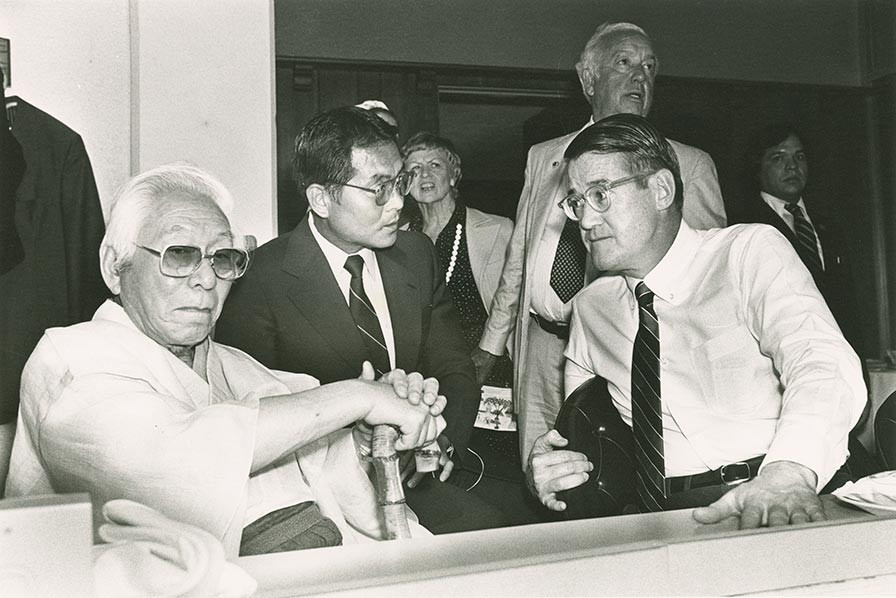
(L-R): Dr. Shigeyoshi Matsumae, founder and president, Tokai University, Tokyo; Akihiro “Ike” Ikuhara; Peter O’Malley, President, Los Angeles Dodgers (1970-1998); and Rod Dedeaux, College Hall of Fame baseball coach from USC (standing behind). Dr. Matsumae, a Japan Baseball Hall of Famer, visited Dodger Stadium on June 14, 1983 and sat in the Chairman’s Box with Peter O’Malley.
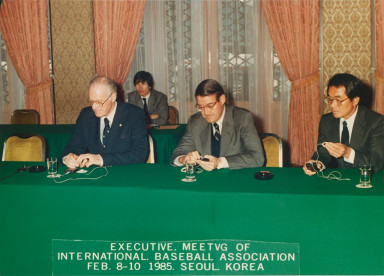
(L-R): Former Baseball Commissioner Bowie Kuhn, Dodger President Peter O’Malley and Assistant to the Dodger President Akihiro “Ike” Ikuhara. Kuhn, O’Malley and Ikuhara are in Seoul, South Korea from February 9-10, 1985 for important meetings of the International Baseball Association (IBA) to discuss the possible inclusion of baseball as a gold medal sport for the 1988 Olympic Games to be held in Seoul.
Dr. Robert Smith, President of Association International Baseball Amateur, the organization responsible for international amateur baseball known as AINBA; Baseball Commissioner Bowie Kuhn; legendary USC Head Baseball Coach Rod Dedeaux; and O’Malley’s leadership led to the inclusion of baseball as a demonstration sport in the Games of the XXIII Olympiad in Los Angeles. Ikuhara was involved in helping to support O’Malley during that significant time in international baseball history. The popularity of baseball at Dodger Stadium in an eight-team exhibition tournament was capped by Japan defeating the USA in the finals. Baseball was the third most attended event during the 1984 Olympics. As an artistic and financial success, the tournament provided impetus for baseball’s gold medal status two years later on October 13, 1986 as voted by the IOC. The first Olympic Games with baseball added to the official program as a gold medal sport was in Barcelona in 1992.
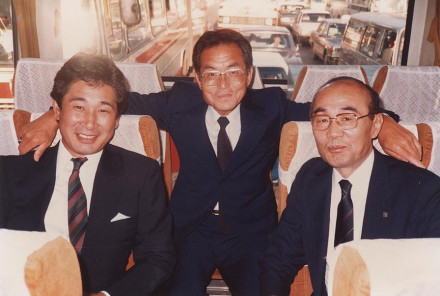
On the bus celebrating the opening of “Dodger Baseball Field” at the Tianjin Institute of Physical Culture, People’s Republic of China, September 12, 1986. (L-R): Senichi Hoshino, NHK-TV baseball analyst and Japan Baseball Hall of Fame pitcher, Chunichi Dragons; Japan Baseball Hall of Famer Akihiro “Ike” Ikuhara; and Ikuo Ikeda, Publisher, Baseball Magazine Sha (Japan). The field was privately built by Dodger President Peter O’Malley, a first in China.
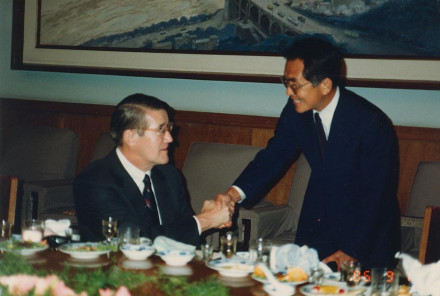
Dodger President Peter O’Malley shakes hands with Akihiro “Ike” Ikuhara, his assistant during a dinner celebrating the opening of “Dodger Baseball Field”, privately built by O’Malley at TIanjin Institute of Physical Culture, People’s Republic of China, September 12, 1986. Ikuhara, the only MLB executive from the USA now in the Japan Baseball Hall of Fame, was a trusted interpreter and traveling companion who frequently accompanied O’Malley on international goodwill trips.
O’Malley had a desire to privately build the first baseball field in the People’s Republic of China. It took many trips to China and developing friendships at the highest levels of government and sports, but O’Malley and Ikuhara persisted in the pursuit, hosting baseball leaders and elected officials at Dodger Stadium, considering potential sites, sending Dodger instructors to Kunming for clinics, and attending meetings in China.
The result of years of establishing those friendships was “Dodger Baseball Field” in China at the Tianjin Institute of Physical and Cultural Education (about 120 kilometers from Beijing). Dedication ceremonies were held on September 12, 1986 and O’Malley and Ikuhara invited numerous international baseball leaders and friends to attend the joyous occasion, including Dr. Matsumae; former Baseball Commissioner Bowie Kuhn; former USC Baseball Head Coach Rod Dedeaux; Little League Baseball President Dr. Creighton Hale; Dr. Bob Smith, President, International Baseball Association (IBA); and Japan Baseball Hall of Fame pitcher Senichi Hoshino. Dodger Baseball Field became home to countless youth, amateur, collegiate and professional baseball games over decades of use and greatly assisted in the development of the sport in China.
In February, 1987, Ikuhara and Dodger batting instructor Ben Hines traveled to Nagoya to assist the development of the professional Chunichi Dragons.
In 1988, Ikuhara was personally asked to mentor struggling left-hand pitcher Masahiro Yamamoto of Japan’s Chunichi Dragons, who was on the verge of being cut. Through the long, hot Florida summer with the Single-A Vero Beach Dodgers, Ikuhara encouraged Yamamoto and taught him a new pitch – the screwball – and it propelled Yamamoto’s career like a rocket. Yamamoto was inducted into the Japan Baseball Hall of Fame in 2022, his 29-season career with Chunichi lasting until he was 50. He won 219 games.
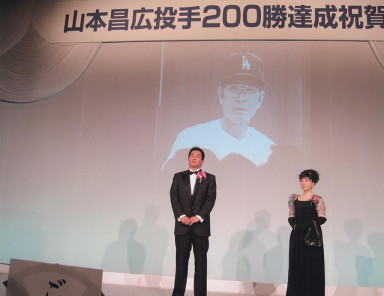
On January 18, 2009 in Nagoya, Japan, Masahiro Yamamoto, Hall of Fame pitcher of the professional Chunichi Dragons, stands on the stage with an image of his friend and mentor Japan Baseball Hall of Famer Akihiro “Ike” Ikuhara in the background. The party celebrates Yamamoto’s 200th career victory in 2008 and was attended by Peter O’Malley.
“It’s fair to say that I am a 200-win pitcher made by Ike’s knowledge,” said Yamamoto in 2009 about his mentor Ikuhara. “He loved coaching me, so I wish he was still alive to see my success today. He just loved baseball so much and day after day he taught me how important fundamentals were. I learned the whole basis in Vero Beach…I couldn’t have asked for a better career.”
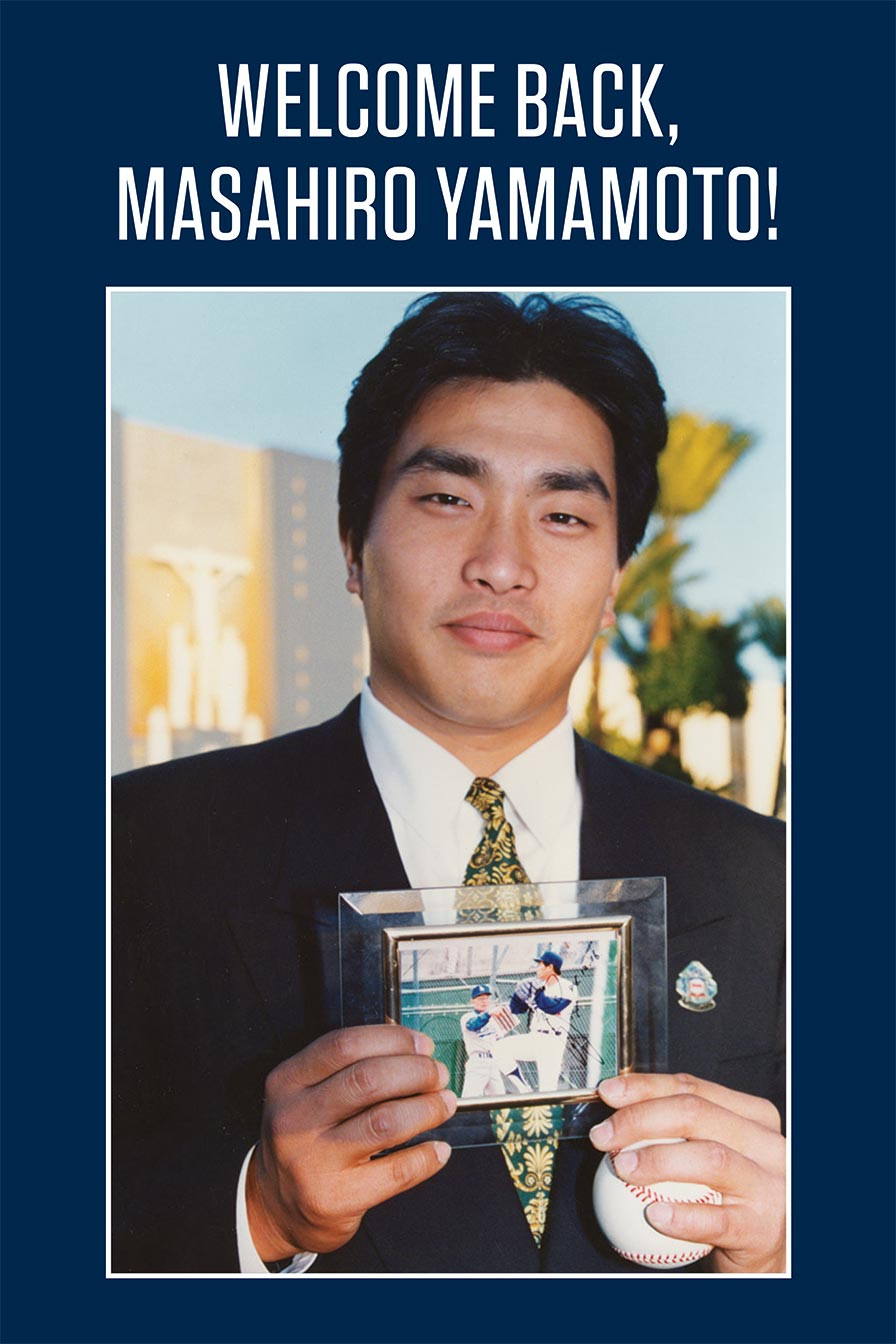
Masahiro Yamamoto, a 2022 Japan Baseball Hall of Fame left-hand pitcher, returned to Dodgertown, Vero Beach, Florida to film the prestigious nationwide show “Another Sky” in Japan. In 2016, Yamamoto selected Historic Dodgertown as the Nippon TV Network program features an interview with a guest at their most memorable place in the world. Dodgertown is where Yamamoto turned his baseball career around in 1988. The professional Chunichi Dragons of Nagoya held spring training at Dodgertown and they wanted to accelerate Yamamoto’s development. Staying and pitching for the Vero Beach Dodgers, Yamamoto was mentored by Akihiro “Ike” Ikuhara, Assistant to O’Malley. Yamamoto would return to the Dragons and pitch for them from 1988 to 2015 becoming a Hall of Famer. He always gives credit to O’Malley and Ikuhara for the role they played in launching his career.
On February 24, 2016, Yamamoto made a triumphant return to Historic Dodgertown, Vero Beach, Florida to film Japan’s prestigious nationwide show “Another Sky”. The format of the Nippon TV Network program features an interview with a guest at their most memorable place in the world and Yamamoto selected Dodgertown because it turned his baseball career around in 1988 under the tutelage of Ikuhara. At the time, Ikuhara told Yamamoto, “Never give up. If you do, that’s the end.” The young pitcher took that advice to heart and kept moving forward.

(L-R): Peter O’Malley, Dodger President; Miichiro Katoh, Chairman, Chunichi Shimbun and owner of Chunichi Dragons; unidentified; Akihiro “Ike” Ikuhara, assistant to Dodger President Peter O’Malley; unidentified. O’Malley welcomes Katoh to the Vero Beach Airport adjacent to Dodgertown, Vero Beach, Florida with a Dodger jacket. The Chunichi Dragons trained at Dodgertown for two and a half weeks, February 15-March 5, 1988 and played the Dodgers during an exhibition game on March 3.

While Japan’s professional Chunichi Dragons are training at Dodgertown, Vero Beach, Florida, two baseball coaches from Russia — Alexander Ardatov and Guela Chikhradze — are introduced at a press conference held by Dodger President Peter O’Malley. Interpreting for the Japanese media is Akihiro “Ike” Ikuhara next to O’Malley, his longtime assistant. Dodgertown was the site of numerous cultural and international baseball exchanges.
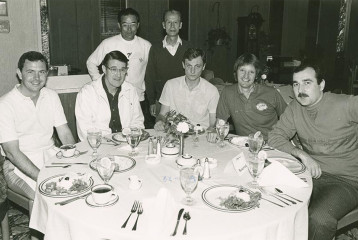
(L-R): Front row – Director, Dodgertown Terry Reynolds; Dodger President Peter O’Malley; Alexander Ardatov, coach from Russia; David Osinski, Executive Director, International Baseball Federation; Guela Chikhradze, baseball coach from Russia. Back row – Akihiro “Ike” Ikuhara, assistant to Dodger President Peter O’Malley; Satoru Ryo Nakayama, President of the Chunichi Dragons. O’Malley hosts baseball coaches Guela Chikhradze and Alexander Ardatov from Russia for lunch in the dining room at Dodgertown, Vero Beach, Florida. The coaches were visiting Dodgertown to learn more about training techniques and instruction to help a fledgling baseball program in Russia. The coaches were at Dodgertown from February 22-26, 1988.
In 1988 Spring Training at Dodgertown, O’Malley invited two baseball coaches from Russia to visit and stay at the site to learn about the Dodger way to play the game. At the same time, the Chunichi Dragons were training at Dodgertown. Ikuhara and O’Malley held a press conference in which Ikuhara fielded questions from reporters from Japan and interpreted them for O’Malley and also the Russian coaches. He would then translate back into Japanese for the visiting press. Ikuhara took questions from the American writers and translated them into Japanese for the Chunichi manager and staff and then interpreted the answers back into English. It was truly a moment of diplomacy through baseball.
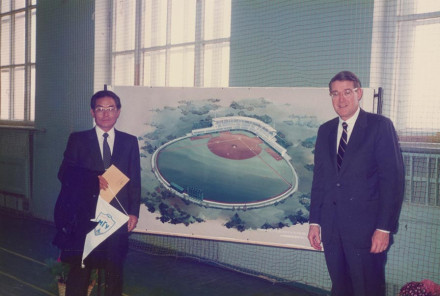
Dodger President Peter O’Malley is in Moscow, Russia for groundbreaking ceremonies for the first field dedicated solely to baseball in Russia, privately constructed by Dr. Shigeyoshi Matsumae, founder of Tokai University, Tokyo. O’Malley is joined by his longtime assistant Akihiro “Ike” Ikuhara on the trip starting April 17, 1988 and they stand next to an artist’s rendering of Matsumae Baseball Stadium. O’Malley and Ikuhara returned for the dedication ceremonies of Matsumae Baseball Stadium on September 1, 1989 on the campus of Moscow State University, Lenin Hill.
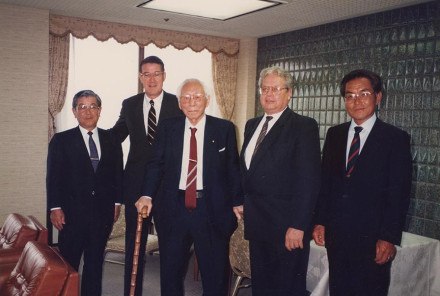
(L-R): Unidentified; Dodger President Peter O’Malley; Dr. Shigeyoshi Matsumae, founder and president, Tokai University, Tokyo; Dr. Creighton Hale, President, Little League Baseball; Akihiro “Ike” Ikuhara, Assistant to Dodger President, June 27, 1988, Tokyo.
On April 17, 1988, O’Malley and Ikuhara made a goodwill trip to Moscow to attend the Groundbreaking Ceremony for Matsumae Baseball Stadium at Moscow State University, a $3.2 million project donated by friend Dr. Matsumae. It was to be the first baseball-only stadium built in the Soviet Union. Rod Dedeaux, the USA Olympic baseball coach in 1964 and 1984, and IBA President Dr. Smith joined them for the historic event. On September 1, 1989, O’Malley and Ikuhara returned to Moscow as guests of Dr. Matsumae for the Grand Opening of Matsumae Stadium and a four-team tournament, another milestone in international baseball history.
Ikuhara teamed with Japan Baseball Hall of Famer Shigeo Nagashima to broadcast the World Series in Japan from 1981-1986.
The author of two baseball books in Japanese, Ikuhara wrote: “The Man Who Survives the Race” in 1984 and “Dodger Way: A Winning Tradition” in 1985. In 1997, his wife Kimiko authored a book, “The Man Who Married the Dodgers”.
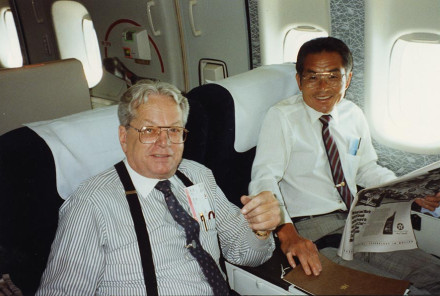
(L-R): Dr. Creighton Hale, President, Little League Baseball; Ike Ikuhara, Assistant to Dodger President Peter O’Malley. Dr. Hale was formerly a physiologist who invented a plastic batting helmet for Little Leaguers. His innovation and care for Little League Baseball led him to be named president in 1974 and later became its Chief Operating Officer where he grew Little League to more than 80 countries. He, Peter O’Malley and Ikuhara frequently traveled on behalf of international baseball.
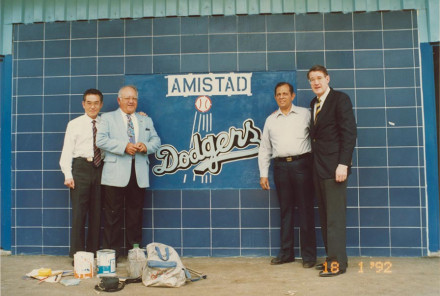
(L-R): Akihiro “Ike” Ikuhara, assistant to Dodger President Peter O’Malley; Ralph Avila, Dodger Vice President, Campo Las Palmas; Carlos Garcia, Minister of Sport, Nicaragua; Peter O’Malley, Dodger President. On January 18, 1992, Peter O’Malley helped to dedicate Dodgers Little League Friendship Field (known as Amistad Dodgers) in Managua, Nicaragua. O’Malley privately built the stadium which seats 3,000 fans and was painted blue in honor of the Dodgers
In October 1990, Ikuhara went with O’Malley to Managua, Nicaragua for the Nicaraguan National Baseball Tournament. Ikuhara recalled in an interview, “Later, Peter was thinking out loud and he said, ‘We really need to do something to help them.’ And I told him, ‘Peter, every time you leave the country you spend money!’” Maryann Hudson, Los Angeles Times, July 10, 1991 Ikuhara and O’Malley returned to Managua for the grand opening of Dodgers Little League Friendship Field (known as Amistad Dodgers) on January 18, 1992, which was privately built by O’Malley for the youth of Nicaragua. The 3,000-seat field was appropriately painted blue and was opened by Nicaragua President Violeta Barrios de Chamorro. Dr. Creighton Hale, President, Little League Baseball, then MLB pitcher Dennis Martinez, and Rod Dedeaux, legendary USC head baseball coach were at the dedication.
In April 1992, O’Malley asked Ikuhara to help Kazushige Nagashima, son of Tokyo Yomiuri Giants Hall of Famer Shigeo Nagashima, while with the Vero Beach Dodgers in the Florida State League. Third baseman Nagashima returned to play three seasons with the Giants after a year in Vero Beach under Ikuhara’s supervision.
On October 26, 1992, Ikuhara passed away at age 55. O’Malley traveled to Tokyo to attend the January 27, 1993 memorial service in honor of his longtime friend and assistant. O’Malley said, “Ike was an extraordinary individual and had the trust and friendship of everyone he worked with. He was truly the Dodgers’ international goodwill ambassador and he will be deeply missed.”
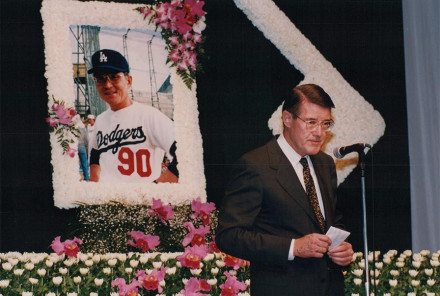
Peter O’Malley, President, Los Angeles Dodgers, from 1970-1998, addresses the attendees at the memorial service to honor Akihiro “Ike” Ikuhara on January 27, 1993 in Tokyo. Ikuhara passed away on October 26, 1992, having worked for the Dodgers since 1965. He served as Assistant to the President from 1982 until his passing, working closely with O’Malley forging friendships and international baseball relationships.
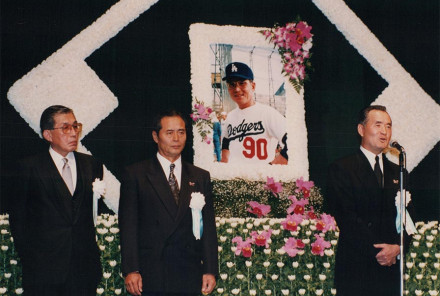
(L-R): Renzo Ishii; Sadaharu Oh; Shigeo Nagashima. Renzo Ishii, longtime head baseball coach at Waseda University, Tokyo, Japan and a Japan Baseball Hall of Famer and Sadaharu Oh, Japan Baseball Hall of Fame slugger from the Tokyo Yomiuri Giants, listen to Japan Baseball Hall of Famer Shigeo Nagashima as he addresses the attendees of the memorial service to honor Akihiro “Ike” Ikuhara on January 27, 1993 in Tokyo.
Longtime sports columnist Allan Malamud wrote, “The international expertise, goodwill and warmth of Akihiro (Ike) Ikuhara, Peter O’Malley’s longtime assistant who died this week, will be missed at Dodger Stadium.” Allan Malamud, Los Angeles Times, Notes on a Scorecard, October 29, 1992
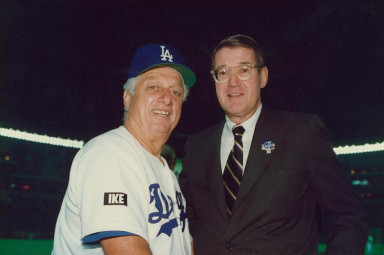
Dodger President Peter O’Malley with Dodger Manager Tommy Lasorda during the 1993 Dodgers Friendship Series in Fukuoka, Japan. Lasorda and the Dodgers wore a special rectangular black patch with the name “IKE” to commemorate O’Malley’s longtime assistant Akihiro “Ike” Ikuhara, who passed on October 26, 1992. The Dodgers played three exhibition games in Taiwan, the first MLB team to play in Taiwan, and two exhibition games against the Daiei Hawks and Tokyo Yomiuri Giants combined teams in Fukuoka, Japan.
Ichiro Yoshikuni, Commissioner of Baseball in Japan, recognized Ikuhara’s significant contributions to improving baseball and promoting goodwill between the U.S. and Japan at the memorial service. To honor the memory of Ikuhara, the Los Angeles Dodgers wore a special black “IKE” rectangular patch on their uniforms (right sleeves) during the 1993 Friendship Series to Taiwan and Japan.
On January 11, 2002, Ikuhara became the only major league executive from the United States to be elected to the Japan Baseball Hall of Fame. Induction ceremonies took place on July 12, 2002 during the Japanese League All-Star Game at Tokyo Dome. O’Malley traveled to Tokyo to participate, alongside Ikuhara’s family members and Dodger executives.
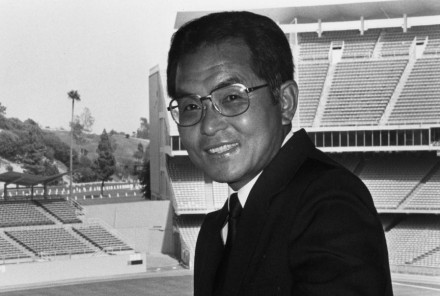
Ike Ikuhara, Assistant to President Peter O’Malley, at Dodger Stadium, Los Angeles. He worked in conjunction with Peter O’Malley for the growth of international baseball, including baseball as a gold medal sport in the Olympic Games, a dream realized with IOC approval in 1986. Ikuhara was posthumously elected to the Japan Baseball Hall of Fame in 2002.
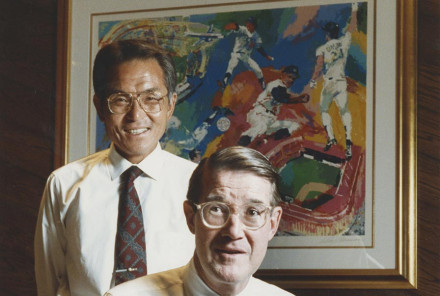
(L-R): Akihiro “Ike” Ikuhara, standing; Peter O’Malley seated at O’Malley’s office, Dodger Stadium, Los Angeles, circa 1990.
Harry Missildine of the Moscow-Pullman Daily News reported on the significance of Ike Ikuhara and his election to the Japan Baseball Hall of Fame on January 25, 2002. “Walter and Peter O’Malley, valued and enhanced the Dodger association with Japanese baseball. The team played postseason tours in Japan and it was Ikuhara who helped coordinate the second trip there in 1966…A cheery, good-looking, smart, enthusiastic young man, Ike’s love and respect for the game were profound.” Harry Missildine, Moscow Pullman Daily News, January 25, 2002
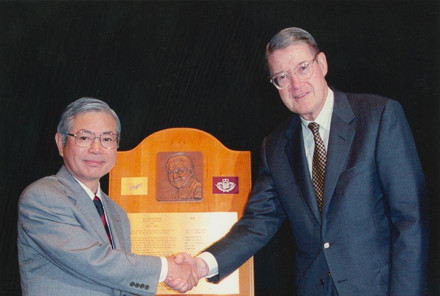
(L-R): Waseda University, Dean, School of Sports Science, Katsuo Yamazaki; Peter O’Malley. On May 16, 2003, O’Malley is the guest speaker for the 2003 Akihiro “Ike” Ikuhara and Peter O’Malley Memorial Sports Management Class at Waseda University in Tokyo. A plaque commemorating Ikuhara is permanently placed at Waseda University, Tokyo, his alma mater. O’Malley held a series of 12 classes from 2003-2009 featuring an all-star lineup of lecturers.
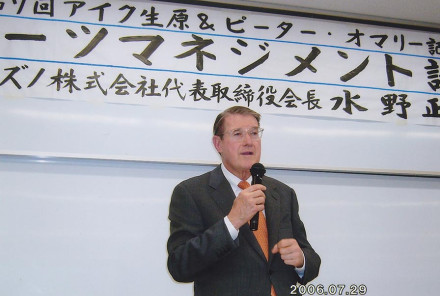
Peter O’Malley speaks at the July 29, 2006 Akihiro “Ike” Ikuhara and Peter O’Malley Memorial Sports Management Class at Waseda University, Tokyo. The guest lecturer was Masato Mizuno, Chairman, Mizuno Corporation and was the seventh of 12 lectures presented by the class from 2003-2009.
In 2003, to honor his longtime friend, Peter developed, established, and sponsored the Akihiro “Ike” Ikuhara and Peter O’Malley Memorial Sports Management Class at Waseda University as a way of encouraging and helping students to pursue a career in sports business. “When he attended Waseda University there was no department emphasizing and encouraging a career in sports management yet he succeeded with the Dodgers as a key executive,” O’Malley said. Ikuhara’s former Waseda Head Baseball Coach Renzo Ishii was instrumental in assisting to connect O’Malley with University President Katsuhiko Shirai and the new School of Sports Sciences Dean, Katsuo Yamazaki to establish the class.
A series of 12 lectures with prominent speakers including two U.S. Presidents – George H.W. Bush in 2006 and George W. Bush in 2009 – ensued.
In 2010, the Waseda University baseball team visited with Peter O’Malley in Los Angeles. The team also went to the gravesite of Walter O’Malley and Ikuhara to pay their respects. The 1994 Waseda baseball team was the first amateur team to visit Dodgertown, Vero Beach, Florida and train alongside the major league Dodgers. After that experience, longtime Waseda Head Baseball Coach Renzo Ishii, a 2020 Japan Baseball Hall of Famer, expressed appreciation to O’Malley by sending an exquisite helmet and suit of armor (“Katchuu” in Japanese), a replica of a Nanban (lit. “Southern Barbarian”), or Western, armor made in the late 16th century. Such European pieces of armor were coveted at that time by samurai, as they provided superior defense against the emerging threat of firearms on the battlefield.
In 2013, Ikuhara’s brother Nobuhisa wrote a biography about Ike’s storied life and donated copies to the National Baseball Hall of Fame in Cooperstown, Japan Baseball Hall of Fame and Waseda University. That same year, an exhibit at the Japan Baseball Hall of Fame called “Baseball in Japan and the O’Malley Family: A Lasting Friendship” displayed items related to the O’Malleys and Ikuhara. Japan Baseball Commissioner Ryozo Kato said about Ikuhara, “He was truly a person who brought American and Asian baseball together.”
In 2019, an exhibit of Ikuhara’s remarkable career was held in his hometown bringing full circle to a man with a dream.

